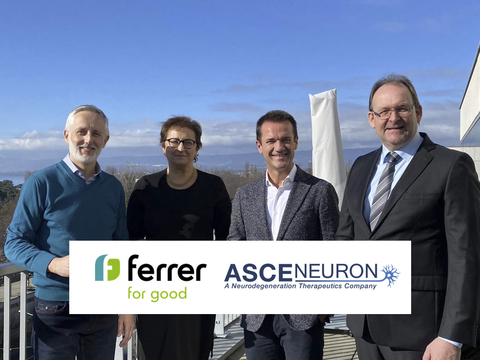Ferrer Acquires Worldwide Rights to ASN90, an O-GlcNAcase Inhibitor From Asceneuron, Exclusively to Treat Progressive Supranuclear Palsy (PSP)
Ferrer Acquires Worldwide Rights to ASN90, an O-GlcNAcase Inhibitor From Asceneuron, Exclusively to Treat Progressive Supranuclear Palsy (PSP)
- ASN90, an O-GlcNAcase inhibitor, is a new chemical entity at clinical stage and a promising candidate for the treatment of PSP, a disorder with a high unmet medical need
- PSP is a rare neurological condition that causes severe problems with walking, balance, speech, swallowing and vision. As the disease progresses, it causes severe disability within three to five years of onset1
- ASN90 in PSP is ready to start phase II of clinical development
From left to right: Oscar Pérez, Chief Marketing, Pricing & Market Access and Business Development Officer (Ferrer), Catherine Moukheibir, Board of Directors (Asceneuron), Mario Rovirosa, CEO (Ferrer) and Dirk Beher, CEO & Co-founder (Asceneuron), after signing the license agreement in Asceneuron's Headquarters in Lausanne, Switzerland. (Photo: Ferrer)
BARCELONA, Spain & LAUSANNE, Switzerland--(BUSINESS WIRE)--Spanish pharmaceutical company Ferrer and Swiss clinical stage biotechnology company Asceneuron announce the signing of a licensing agreement in which Ferrer obtains the exclusive worldwide rights to develop and commercialize ASN90 in progressive supranuclear palsy (PSP), an orphan, tau-related disease with a high unmet medical need1.
Both Ferrer and Asceneuron are pleased that this announcement occurs in close occurrence with Rare Disease Day (February 28). This agreement underscores the commitments both companies have undertaken to improve the lives of patients with a rare disease, such as PSP.
The terms of the agreement include an upfront fee and multiple development, regulatory and commercial milestone payments. Asceneuron is also eligible to receive tiered double-digit royalties on worldwide net sales of ASN90.
Mario Rovirosa, Ferrer’s Chief Executive Officer, stated: “This is yet another meaningful example of how Ferrer moves forward guided by its purpose of making a positive impact in society. As a B Corp company, we are proud of our people’s commitment to delivering the best possible solutions for those in need.”
Dirk Beher, Chief Executive Officer and Co-Founder of Asceneuron, commented: “This licensing agreement with Ferrer is important news for patients suffering from PSP and their families. Asceneuron, as a neurodegeneration-focused company, will continue expanding the application of OGA mechanism in other diseases in addition to developing further programs in some of the largest unmet medical need indications in neurology.”
Oscar Pérez, Chief Business Development and Global Alliances Officer at Ferrer, added: “Researching a cure for such a devastating condition that lacks available therapeutic options fits perfectly with Ferrer’s mission to develop transformative treatments. We are seeking to generate life-changing solutions for people with PSP. ASN90 is a very promising addition to our growing portfolio in neurological disorders, making Ferrer an increasingly relevant player in the field of neuroscience.”
Ferrer will now conduct a phase II clinical study to determine the efficacy and optimal dose range of ASN90.
SVB Securities acted as exclusive financial advisor to Asceneuron.
About progressive supranuclear palsy
PSP is a rare neurological condition which typically presents at around 60 years of age and causes severe problems related to walking, balance, speech, swallowing and vision as a result of the accumulation of aggregates of the tau protein in the brain1,2. The disease gets progressively worse, causing severe disability within three to five years of onset. It is estimated that three to six people per 100,0001 will develop PSP and there is currently no known cure for the disease1,2.
-----------------------------------------------------ENDS------------------------------------------------------
1. Coughlin DG, Litvan I. Progressive supranuclear palsy: Advances in diagnosis and management. Parkinsonism Relat Disord. 2020 Apr;73:105-116. doi: 10.1016/j.parkreldis.2020.04.014. Epub 2020 May 25.
2. Lopez G, Bayulkem K, Hallett M. Progressive supranuclear palsy (PSP): Richardson syndrome and other PSP variants. Acta Neurol Scand. 2016 Oct;134(4):242-9. doi: 10.1111/ane.12546. Epub 2016 Jan 6.
Contacts
For more information:
gortizdez@ferrer.com
+34 936 003 779


